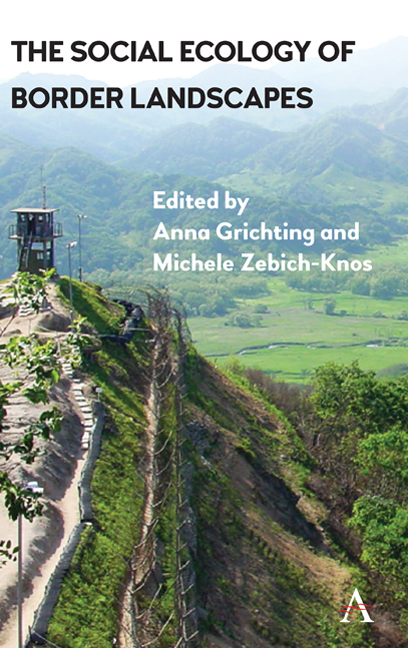Book contents
- Frontmatter
- Contents
- List of Illustrations
- Preface
- List of Contributors
- Introduction: Social Ecologies and Borderlands
- Part I FRAMES: MAPPING SOCIAL ECOLOGIES IN BORDER TERRITORIES
- Chapter One On the Agency of Borderlands
- Chapter Two Social Ecology and Transboundary Conservation: (Re)connecting Nature and People in Borderlands
- Chapter Three Social Ecologies and Structural Violence: Boundary-Making as Nature-Making in a Gated Globe
- Part II BRIDGES: RESILIENCE, RESTORATION AND RECLAMATION
- Part III CORRIDORS: CATALYSTS AND COLLABORATION IN CONFINED SPACES
- Part IV PORTALS: DIALOGUE, EXCEPTION AND RETERRITORIALIZATION
- Conclusion: Making Sense of Social Ecology, Borders and the Environment
- Index
Chapter One - On the Agency of Borderlands
from Part I - FRAMES: MAPPING SOCIAL ECOLOGIES IN BORDER TERRITORIES
Published online by Cambridge University Press: 10 January 2018
- Frontmatter
- Contents
- List of Illustrations
- Preface
- List of Contributors
- Introduction: Social Ecologies and Borderlands
- Part I FRAMES: MAPPING SOCIAL ECOLOGIES IN BORDER TERRITORIES
- Chapter One On the Agency of Borderlands
- Chapter Two Social Ecology and Transboundary Conservation: (Re)connecting Nature and People in Borderlands
- Chapter Three Social Ecologies and Structural Violence: Boundary-Making as Nature-Making in a Gated Globe
- Part II BRIDGES: RESILIENCE, RESTORATION AND RECLAMATION
- Part III CORRIDORS: CATALYSTS AND COLLABORATION IN CONFINED SPACES
- Part IV PORTALS: DIALOGUE, EXCEPTION AND RETERRITORIALIZATION
- Conclusion: Making Sense of Social Ecology, Borders and the Environment
- Index
Summary
In the 2004 movie The Terminal, an unsophisticated citizen of the fictitious country Krakozhia confronts the ambivalence of authority, the notion of in-betweenness and the true meaning of liminal space, after he lands in the United States only to learn that he is in border limbo due to political events out of his control. He is told by a border official, “You have no legal right to enter the U.S. and I have no right to detain you. It seems you have fallen through a small crack in the system. […] [U] ntil we get this sorted out, I have no choice but to allow you to enter the International Transit Lounge. I'm going to sign a release form that is going to make you a free man […] free to go anywhere you like within the confines of the International Transit Lounge.” This lighthearted example reads like a theater of the absurd, yet it occurs globally in more serious iterations as humans create and challenge international ordering principles that can subsequently impact both humans and nature. With specific reference to Chapter 5 of this volume, we should ask ourselves who actually thought the international ordering principle that resulted in the DMZ's creation would be beneficial to Korean wildlife.
Introduction: Borderlands, Limits and Liminalities
In Nation and Narration Homi K. Bhabha criticizes “essentialist” readings of nationhood; these propagate a specific understanding of culture as a singular and possibly a historically homogeneous set of cultural traditions. In The Location of Culture he puts forward the idea that nations and their cultures are “narratives” that emerge out of discussions and confrontations with what he suggests are hybrids, in a process of production of a singular cultural identity. For Bourdieu, a similar cultural process emerges out of distinction — as the study of relations between social classes and status groups. In the Weberian sense of style of life of differentiated collectivities, distinction is a cultural process where minute differences lead to fundamental individuation and the cultural production of class differences. Interestingly, Bhabha opposes ideas of hybridity and liminality and the “interrogatory, interstitial space” to a retrograde historicism that dominates Western critical thinking. He writes: “The liminal figure of the nation-space would ensure that no political ideologies could claim transcendent or metaphysical authority for themselves.
- Type
- Chapter
- Information
- The Social Ecology of Border Landscapes , pp. 19 - 36Publisher: Anthem PressPrint publication year: 2017



